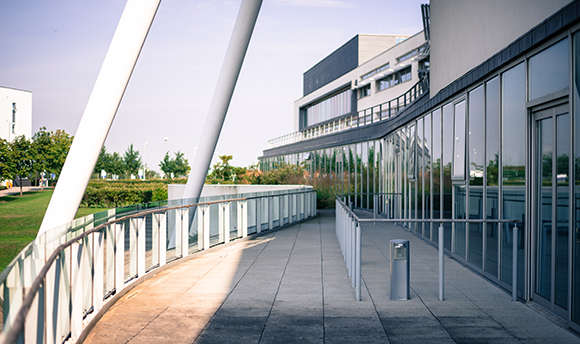At 27, Federica Di Pardo is already building a successful career as a physiotherapist in Switzerland while completing her Master of Research (MRes) at QMU. Originally from Italy, she chose QMU for its strong reputation in rehabilitation sciences and the flexibility of a fully online programme that fits around her professional life.
The MRes gives students the chance to shape their research around their own interests, and Federica has chosen to explore the rehabilitation experiences of transgender women after vaginoplasty – an under-researched area she believes can make a real difference to patient care.
Looking ahead, Federica hopes to combine her clinical expertise with more research and eventually pursue a PhD. For now, she’s embracing the balance QMU offers and encourages future students to dive in and make the most of the experience.
Find out more in her Student Story.
Why did you choose to study the MRes at QMU?
I chose QMU because of its strong reputation in rehabilitation sciences and also thanks to the advice of a professor I know personally, who completed his PhD at QMU and is now the director of the rehabilitation research centre at SUPSI in Switzerland. I was also attracted to the structure of the course: it is flexible, well-organised for part-time students, and allows me to study fully online while obtaining a degree that is internationally recognised. This balance between academic development and professional life was essential for me.
Tell us about your MRes topic.
My research focuses on qualitative methodology within the field of pelvic floor rehabilitation. More specifically, I am conducting a study exploring the rehabilitation experiences of transgender women after vaginoplasty. I believe this is a valuable and under-researched area that has the potential to improve patient care and raise awareness of diverse rehabilitation needs.
What interested you about your chosen topic?
My clinical background in physiotherapy made me realise how much pelvic floor rehabilitation can impact patients’ lives. The opportunity to focus on the experiences of transgender women after vaginoplasty felt particularly meaningful, as this group often faces unique challenges and limited representation in rehabilitation research. By listening to their perspectives, I hope to contribute to more inclusive and evidence-informed approaches that can improve practice in the future.
What did you study before the MRes?
I completed my undergraduate degree in Physiotherapy at the University of Turin (Italy) before moving to Switzerland to continue my professional career. Even though I didn’t study at QMU before the MRes, I was confident it would be the right place to strengthen my research skills.
What do you most enjoy about your MRes?
I really enjoy the multidisciplinary nature of the programme. The fact that students and lecturers come from a range of professional and academic backgrounds makes every discussion richer and broadens my perspective beyond the rehabilitation field. I also appreciate how the part-time structure gradually integrates theory with practice - each module gives us the chance to immediately apply what we’ve learned, which feels both relevant and rewarding.
How do your lecturers support your learning?
The support from lecturers has been excellent. They are always open to providing feedback, both within individual modules and throughout the course. I particularly value the constant availability of my project supervisor, who regularly sets up video calls to discuss my progress and challenges. Even though I am studying remotely, I feel I can rely on ongoing guidance and constructive conversations that help me grow academically.
I also find that the online meetings and group discussions create a real sense of community. These interactions allow me to share experiences with fellow students and feel connected to the wider university environment, despite the distance.
What do you hope to do with your degree upon graduating?
I hope to continue combining my clinical work with a growing involvement in research. In the long term, I would like to pursue an academic career and potentially a PhD. I see the MRes as a stepping stone that will allow me to contribute both to clinical practice and to the advancement of rehabilitation science.
What advice do you have for any potential students looking to complete the MRes?
My main advice would be to engage actively in the online meetings, as they are extremely useful and inspiring for developing both knowledge and practical research skills. Time management is also crucial - QMU provides an impressive amount of useful material and recommended reading, but it’s important to prioritise what is most relevant for your discipline and for each assignment. Leave the additional material for later, if you have time. Finally, don’t hesitate to ask questions or request meetings - lecturers are incredibly prepared and generous with their time, and these two years will pass quickly. Make the most of the experience and enjoy it!



